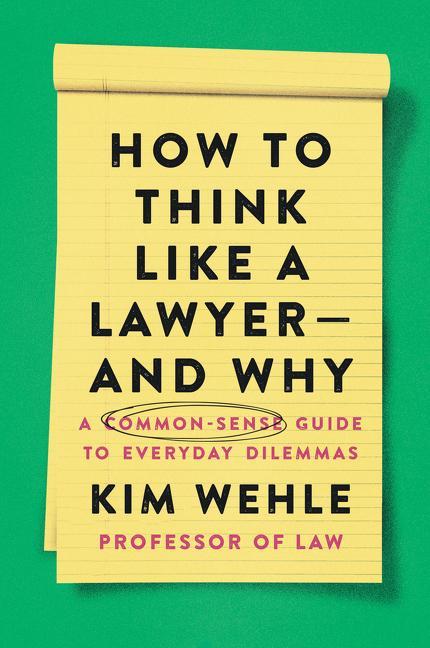How To Think Like A Lawyer– And Why : A Common- Sense Guide To Everyday Dilemmas by Kim Wehle

View book: How To Think Like A Lawyer– And Why : A Common- Sense Guide To Everyday Dilemmas
A law professor and author teaches non-attorneys the art of thinking like a lawyer to gain an advantage in various aspects of life, be it purchasing a home, salary negotiations, or healthcare choices. Lawyers possess a unique mindset, often venturing into arguments that others would avoid and scrutinizing menus for errors out of habit. While their meticulousness may sometimes be bothersome, it can also prove to be an invaluable skill.
Are you faced with the responsibility of making healthcare decisions for an aging parent but find yourself unsure of how to begin? Do you find yourself at a career crossroads, unsure of which path to take? Have you ever served on a jury and struggled to decipher perplexing legal instructions? How to Think Like a Lawyer provides you with the insight to navigate through these complexities and gain an edge in your day-to-day life.
Kim Wehle reveals the key details that demand your attention, the essential questions to pose, the anticipated responses, and the pitfalls to steer clear of. The book covers a range of topics, including buying and selling property, comprehending employment terms, establishing wills and healthcare proxies, confronting health concerns, securing financial aid, and negotiating divorces.
Wehle offers a roadmap to dissect intricate issues into more manageable, comprehensible fragments, granting you the tools to make informed decisions across all facets of existence.
Thinking Like a Lawyer: Navigating Everyday Dilemmas
All right, here’s the rewritten content in a ideal format for a web article:
Kim Whaley Talks About Her New Book and Thinking Like a Lawyer
All right here to talk with us about her latest book, “How to Think Like a Lawyer,” is Kim Whaley. Kim Whaley is a former US Assistant Attorney and a professor at the Baltimore School of Law. She is also an accomplished author. In this interview, she shares insights about her book and the importance of thinking like a lawyer.
In her book, Kim Whaley provides a five-step framework for approaching problems and making decisions. She emphasizes the need to look for questions rather than answers and to consider different perspectives and arguments. By applying this method to everyday dilemmas, readers can develop critical thinking skills and make more informed choices.
Whaley’s inspiration for writing the book came from her experience teaching law and observing the polarized way in which people approach issues. She noticed that individuals often become entrenched in their own beliefs and fail to consider alternative viewpoints. She believes that thinking like a lawyer can help people approach problems with more open-mindedness and find common ground, even in heated debates.
The book is not just for aspiring lawyers. Whaley explains that it is meant to empower all individuals to approach problems with a thorough, careful, and comprehensive analysis. Through clear and concise explanations, she breaks down complex legal concepts and applies them to everyday situations. The book serves as a guide for anyone wanting to enhance their critical thinking skills and make better decisions.
Whaley also discusses how thinking like a lawyer can benefit parents. By identifying their values and applying them to parenting decisions, parents can navigate complex issues with more clarity. The framework provided in the book helps parents make informed choices and understand the reasoning behind their decisions.
The conversation then shifts to current legal issues, including the cases involving former President Donald Trump. Whaley predicts that accountability for Trump may be on the horizon, with multiple investigations and legal proceedings underway. She highlights the recent ruling in Georgia, where prosecutors are actively investigating Trump’s attempt to overturn election results. Whaley also discusses the ongoing investigations into Trump’s business practices and potential violations of the law.
When asked about the Supreme Court and its trajectory, Whaley expresses concern about the conservative majority and its potential impact on important issues such as abortion rights and voting rights. She points out that the court has already made controversial decisions that go against established legal principles. Whaley worries that the court’s actions could undermine the rule of law and have long-lasting effects on American society.
Finally, Whaley addresses the importance of holding onto democratic values in the face of single-party rule. She encourages people to think critically, question authority, and actively engage in the democratic process.
In conclusion, “How to Think Like a Lawyer” provides a valuable framework for approaching complex issues and making informed decisions. Whaley’s insights and expertise offer practical guidance for readers seeking to enhance their critical thinking skills. Whether it’s navigating personal dilemmas or understanding the implications of legal cases, thinking like a lawyer can help individuals find clarity and make more reasoned choices.
If you’re interested in learning more about “How to Think Like a Lawyer,” you can pre-order the book and stay tuned for its release on Tuesday.







Leave a Reply